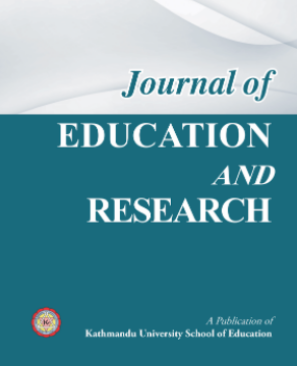
Private Schooling and Fayol's Principles of Management: A Case from Nepal
Original Article
Journal of Education and Research, Volume 3, Issue 1, 2013, 6-23, https://doi.org/10.3126/jer.v3i0.7849
Publication date: Mar 29, 2013
Views: 784 | Downloads: 568
How to cite this article
APA
In-text citation: (Poudyal, 2013)
Reference: Poudyal, C. S. (2013). Private Schooling and Fayol's Principles of Management: A Case from Nepal. Journal of Education and Research, 3(1), 6-23. https://doi.org/10.3126/jer.v3i0.7849
Reference: Poudyal, C. S. (2013). Private Schooling and Fayol's Principles of Management: A Case from Nepal. Journal of Education and Research, 3(1), 6-23. https://doi.org/10.3126/jer.v3i0.7849
Vancouver
In-text citation: (1), (2), (3), etc.
Reference: Poudyal CS. Private Schooling and Fayol's Principles of Management: A Case from Nepal. Journal of Education and Research. 2013;3(1):6-23. https://doi.org/10.3126/jer.v3i0.7849
Reference: Poudyal CS. Private Schooling and Fayol's Principles of Management: A Case from Nepal. Journal of Education and Research. 2013;3(1):6-23. https://doi.org/10.3126/jer.v3i0.7849
AMA
In-text citation: (1), (2), (3), etc.
Reference: Poudyal CS. Private Schooling and Fayol's Principles of Management: A Case from Nepal. Journal of Education and Research. 2013;3(1), 6-23. https://doi.org/10.3126/jer.v3i0.7849
Reference: Poudyal CS. Private Schooling and Fayol's Principles of Management: A Case from Nepal. Journal of Education and Research. 2013;3(1), 6-23. https://doi.org/10.3126/jer.v3i0.7849
Chicago
In-text citation: (Poudyal, 2013)
Reference: Poudyal, Chandra Sharma. "Private Schooling and Fayol's Principles of Management: A Case from Nepal". Journal of Education and Research 2013 3 no. 1 (2013): 6-23. https://doi.org/10.3126/jer.v3i0.7849
Reference: Poudyal, Chandra Sharma. "Private Schooling and Fayol's Principles of Management: A Case from Nepal". Journal of Education and Research 2013 3 no. 1 (2013): 6-23. https://doi.org/10.3126/jer.v3i0.7849
Harvard
In-text citation: (Poudyal, 2013)
Reference: Poudyal, C. S. (2013). Private Schooling and Fayol's Principles of Management: A Case from Nepal. Journal of Education and Research, 3(1), pp. 6-23. https://doi.org/10.3126/jer.v3i0.7849
Reference: Poudyal, C. S. (2013). Private Schooling and Fayol's Principles of Management: A Case from Nepal. Journal of Education and Research, 3(1), pp. 6-23. https://doi.org/10.3126/jer.v3i0.7849
MLA
In-text citation: (Poudyal, 2013)
Reference: Poudyal, Chandra Sharma "Private Schooling and Fayol's Principles of Management: A Case from Nepal". Journal of Education and Research, vol. 3, no. 1, 2013, pp. 6-23. https://doi.org/10.3126/jer.v3i0.7849
Reference: Poudyal, Chandra Sharma "Private Schooling and Fayol's Principles of Management: A Case from Nepal". Journal of Education and Research, vol. 3, no. 1, 2013, pp. 6-23. https://doi.org/10.3126/jer.v3i0.7849
ABSTRACT
Henri Fayol is popularly known as the founder of administrative management for his contribution to the field of management. Although his principles of management are termed as classical management theory, the principles are still applicable in the field of management. In this paper I explore the issues of management and ownership in two private schools in Nepal using Fayol's principles of management.
The data were collected from two private schools using a case study approach. I conducted semi- structured interviews with teachers, administrators and principals of two private schools. In the case study schools, the owners were also working in the capacity of principal of the school and hence the term owner/principal has been used in this paper. The owners/principals were taken as the participants to represent the voice of the employers while the teachers were taken to represent the voice of the employees. Similarly, the administrators in this study represent the voices of both the employer and the employees of the school.
This study suggests that when management and ownership are not separated, there is a concentration of power. The power concentration in individual or group of owners gives rise to a number of management related issues such as unequal distribution of authority and responsibility, role ambiguity, negative motivation and conflict of interest. Fayol's principles of authority and responsibility, initiative, subordination of individual interest to group interest, stability of tenure of personnel and spirit of cooperation have been used in this paper to explain several issues of management and ownership that emerged from the case study.
The data were collected from two private schools using a case study approach. I conducted semi- structured interviews with teachers, administrators and principals of two private schools. In the case study schools, the owners were also working in the capacity of principal of the school and hence the term owner/principal has been used in this paper. The owners/principals were taken as the participants to represent the voice of the employers while the teachers were taken to represent the voice of the employees. Similarly, the administrators in this study represent the voices of both the employer and the employees of the school.
This study suggests that when management and ownership are not separated, there is a concentration of power. The power concentration in individual or group of owners gives rise to a number of management related issues such as unequal distribution of authority and responsibility, role ambiguity, negative motivation and conflict of interest. Fayol's principles of authority and responsibility, initiative, subordination of individual interest to group interest, stability of tenure of personnel and spirit of cooperation have been used in this paper to explain several issues of management and ownership that emerged from the case study.
KEYWORDS
REFERENCES
---
LICENSE
This work is licensed under a Creative Commons Attribution 4.0 International License.
